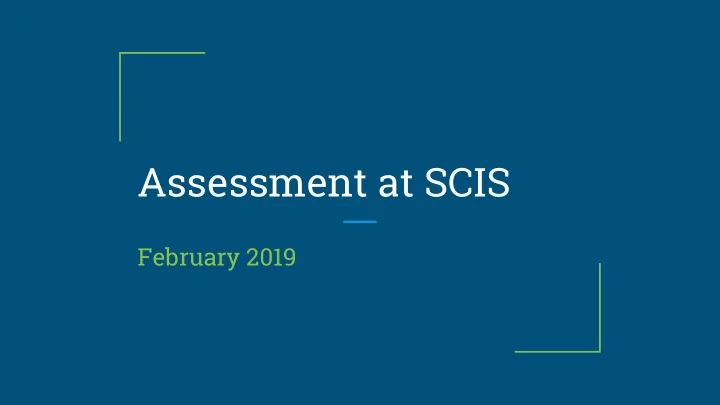

Assessment at SCIS February 2019
Why do we need assessment?
How does assessment align with teaching?
What types of assessment are there?
How does assessment feed into learning?
What are the IB principles of assessment? IB assessments must: 1. be valid for the purposes for which they are intended. 2. have a positive backwash effect. 3. be appropriate to the widest possible range of candidates. 4. be part of the context of a wider IB programme. 5. support the IB’s wider mission and student competencies. Assessment principles and practices—Quality assessments in a digital age (2018)
Things MYP students say... ● Formative ● Summative ● Criteria B ● The Rubric ● ATL (approaches to learning) skills
What is a Formative Assessment? A task designed to assist students learning and progress toward the final and assessed (summative) task Valuable piece of feedback and learning
Things that may be thought about Formative Assessments ● They don’t count - so not worth doing ● Not important because its not graded ● There is no point in completing them Happy to say all of these statements are incorrect! In fact VERY incorrect for our students
Tasting the Soup When the cook tastes the soup – that’s formative assessment When the customer tastes the soup – that’s summative assessment
Playing to Win Training sessions to develop skills – that’s formative assessment The game/competition – that’s summative assessment
Your turn… Introduce yourself to the people around you (if you haven’t already done so) Can you come up with an analogy of formative and summative assessment?
Summative Assessment ? How is it created? What does it look like? How is it graded?
How is an Assessment task created and what could it look like? As a collaborative team, teachers create a task which will provide opportunities for students to demonstrate their learning Students within a grade level are given the same tasks and opportunities What the task looks like is an endless answer...which is remarkable
How is a Summative Assessment given a grade? The summative assessment task is designed to address subject specific objectives and criteria “I have to finish my criterion B for design”
Criterion B Design
Rubrics & Criterion based assessment ▪ less subjective ▪ provides clear and specific expectations ▪ fosters improvement Students like it!
Approaches to Learning skills “Learning how to Learn” Life Skills Skills incorporated into Assessments E.g. “Gather and organize relevant information to formulate an argument”
Assessment in MYP at SCIS Cannot be rushed! A Rubrics Formative Approaches B to Learning skills Criteria In Depth C tasks D Summative
Report Cards - Semester 22/32 I got a 5 Each subject has 4 criteria that are scored out of 8 Based on IB published 4 x 8 = 32 boundaries Measured on 1 - 7 Scale
?/8 5 6 4 7
Report Cards - Semester 22/32 I got a 5 Each subject has 4 criteria that are scored out of 8 Based on IB published 4 x 8 = 32 boundaries Measured on 1 - 7 Scale
Forget everything we said, here’s DP ● High-stakes assessment with 70-80% of subject results based on final examinations ● ● Internal assessment compared to 150,000+ students around the world ● ● University decisions based on a single number out of 45 ● ● Retakes available 6 months after examination session
Assessment Objectives
Predicting grades
Predicting grades
Predicting grades
Thank you!
Recommend
More recommend